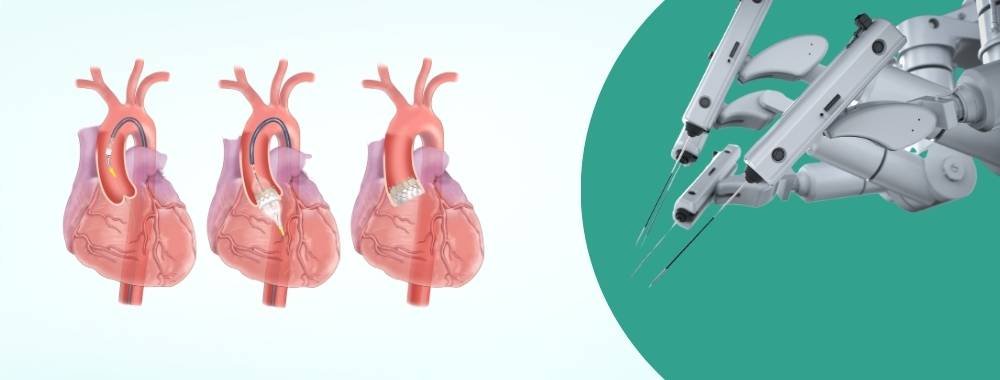Undergo affordable TAVR surgery in India with highly experienced cardiac surgeons. Benefit from advanced heart valve treatment at the affordable cost of similar procedures abroad.
Recovery Time
3 Weeks
Success Rate
97%
Hospital Stay
6 Days
Treatment Type
Surgical
Home Treatments Cardiology Transcatheter Aortic Valve Replacement (TAVR)
Are you concerned about the risks and costs of heart valve surgery?
TAVR, a transcatheter aortic valve replacement, is performed to replace the narrowed aortic valve.
It offers a minimally invasive solution for aortic valve replacement, reducing recovery time and risk compared to traditional surgery.
If you are struggling with high costs in your country, then India offers TAVR at an affordable cost. Its advanced medical infrastructure, experienced surgeons, and the latest technologies make India the top choice for international patients seeking TAVR.
Choose India for quality care at an affordable cost and benefit from the expertise of leading cardiac specialists.
-cost-in-india.jpg)
Transcatheter aortic valve replacement TAVR or transcatheter aortic valve implantation are the same, but one surgical procedure and the other is an implantation process that helps to replace an aortic valve that is narrowed and doesn't open properly. However, the aortic valve is between the left lower heart chamber and the body’s main artery, and when the valve is narrowed, it is called aortic valve stenosis, which causes slow blood circulation from the heart to the body.
Additionally, it’s a minimally invasive procedure which means it uses smaller incisions than open heart valve surgery and it might be the option for patients who can’t have heart surgery to replace the valve.
It's an alternative option for open-heart aortic valve replacement surgery, and patients with TAVR have shorter hospital stays as compared to patients who have heart surgery to replace the valve.
However, the most common reason to undergo TAVR is aortic stenosis, which is a narrowing of your aortic valve or the area around it. Yet, narrowing happens because of:
TAVR is generally recommended for elder patients who are at higher risk for traditional open-heart surgery, however, there’s no age limit, but it is often considered for patients 70 years or above.
Transcatheter Aortic Valve Replacement (TAVR) is a treatment to replace stenosed or regurgitant aortic valves.
Aortic stenosis is a condition where the aortic valve becomes stiff and narrow. This prevents the valve from fully opening, reducing blood flow to the body.
Aortic Regurgitation is a heart condition that occurs when the aortic valve doesn't close properly, causing blood to flow backward into the heart
Doctors may recommend TAVR if you have:
Transcatheter aortic valve replacement costs are affordable compared to Western countries, including surgical costs, diagnostic tests, rehabilitation if needed, follow-ups, and so on.
Cost Component | Details | Estimated Cost in USD |
Pre-operative Consultation & Diagnosis | Consultations, X-rays, MRI scans, blood tests | 700 USD |
Surgery Costs | Includes surgeon fees, type of surgery, and hospital stay | 40000 USD |
Rehabilitation and Follow-up | Physiotherapy sessions, medications, supportive devices, and follow-up visits | Variable by Procedure |

The cost can change depending on the hospital you choose, as things like the building, care quality, and available services can affect the price.
Another factor that affects the cost is the choice of valve used in the procedure because there are two types of valves, such as a tissue valve and a mechanical valve, yet a tissue valve is more expensive, which might affect the cost.
Surgeons with more experience and qualifications usually charge more for consultations, which can raise the overall cost.
Before surgery, you may need blood tests, X-rays, MRIs, and EKGs. MRI and EKG are more expensive than X-rays, and the seriousness of your condition can also impact the cost.
The longer you stay there, the more it will cost. The type of room you choose, such as private, deluxe, or shared, also affects the price.
After surgery, you will need to take medications. The cost depends on how long you need them, as taking them for a longer time will increase the charges.
This is another factor that affects the cost which includes various diagnostic tests, consultations, medications, and follow-up visits.
Fill in your details and we'll get back to you soonGet Free Treatment Quote
Country | Cost Structure |
India | 40000 USD |
United States | 50000-70000 USD |
Germany | 35000-55000 USD |
Turkey | 20000-30000 USD |
◾Key Takeaways
✅ Affordable Treatment Cost: India offers affordable treatment solutions for international patients seeking TAVR where you can save up to 30% of the cost in Western countries.
✅ Advanced Medical Tecnologies: India uses some of the advanced technologies for treating TAVR for patient care to ensure faster recovery and better outcomes.
Transcatheter Aortic Valve Replacement (TAVR) cost
Treatment Name
Estimated Cost
Transcatheter Aortic Valve Replacement (TAVR) 40000 USD
India offers high-quality care for Transcatheter Aortic Valve Replacement (TAVR), which includes:
India is a preferred destination for international patients due to India’s quality care and affordability, which is lower compared to other Western countries.
India has highly skilled cardiologists with over 20 years of experience, many of whom have been trained internationally.
Indian hospitals use the latest technologies, such as balloon-expandable and self-expanding valves and advanced imaging systems, which improve precision and lead to better outcomes.
Many hospitals in India are accredited by JCI and NABH, meaning they meet global standards for patient safety, quality care, and top-notch infrastructure.
Choosing India for TAVR surgery ensures access to world-class medical facilities, shorter recovery times, and lower healthcare costs, which makes it an ideal option for patients worldwide.
India has many highly skilled cardiac specialists who specialize in performing angioplasty and effective treatments aimed at delivering advanced and specialized medical care to patients.
Beds: 539
New Delhi
Beds: 230
New Delhi
Beds: 710
New Delhi
Beds: 650
New Delhi
Beds: 191
New Delhi
Beds: 310
New Delhi
Beds: 330
Gurugram
Beds: 380
New Delhi
Beds: 402
New Delhi
Beds: 1300+
Gurugram
Beds: 1000
New Delhi
Beds: 450
Faridabad
Beds: 675
New Delhi
Beds: 500
New Delhi
Beds: 400+
Faridabad

Max Super Speciality Hospital, Saket

Aakash Healthcare Super Speciality Hospital

Indraprastha Apollo Hospital

BLK Max Super Speciality Hospital

Dharamshila Narayana Superspeciality Hospital

Fortis Escorts Heart Institute

Fortis Memorial Research Institute

Manipal Hospital Dwarka

Max Super Speciality Hospital Shalimar Bagh

Medanta - The Medicity Hospital

Moolchand Kharaiti Ram Hospital

Sarvodaya Hospital

Sir Ganga Ram Hospital

Venkateshwar Hospital

Metro Heart Institute with Multispecialty
Indian hospitals deliver innovative technology and high-quality care, and they support recovery based on each patient.
Necessary Diagnostic Tests
Tests | Description |
Echocardiogram | A painless test that uses sound waves to create an image of the heart, showing its size, shape, and how well it pumps blood. |
Electrocardiogram (EKG) | A quick test that records the heart's electrical signals to show how it's beating. |
Computed Tomography (CT) Scan | An imaging test is used to measure the aortic annulus and determine the size of the valve. |
Cardiac Catheterization | A procedure that measures blood flow in the heart and checks for any issues. |
🟢Do’s Before Surgery
✅ Carefully follow all instructions from your doctor about what to do and avoid, including dietary restrictions and medication guidelines.
✅ Drink plenty of water if approved by your doctor, as it helps prepare your body for the procedure.
✅ Ensure you complete all necessary pre-surgery tests, like blood tests, EKG, and imaging, to help the medical team prepare.
✅ Stop smoking a few weeks before surgery, as it can affect recovery and increase the risk of complications.
🔴Don’ts Before Surgery
❌ Follow fasting instructions and avoid eating or drinking 8–12 hours before surgery to prevent anesthesia complications.
❌ Avoid blood-thinning medications and other medicines as directed, as they can increase bleeding risks during surgery.
❌ Refrain from smoking and drinking alcohol for at least 24 hours before surgery, as they can interfere with anesthesia.
❌ Remove all jewelry, piercings, and contact lenses before arriving at the hospital to ensure a safe procedure.
Before the Surgery
During the Surgery
After the Surgery
Fill in your details and we'll get back to you soonGet Free Treatment Quote

This technology uses a balloon to expand and position the replacement valve inside the aorta. It’s commonly used for patients with severe aortic stenosis, providing precise placement.
These valves expand on their own once positioned in the heart, reducing the risk of tissue damage and offering a precise approach for valve replacement.
CT and 3D imaging give doctors detailed pictures of the heart and valves, helping them plan the procedure with great accuracy.
IVUS provides real-time images inside blood vessels, allowing doctors to see where the new valve will be placed.
Some hospitals in India use robotic systems for TAVR procedures, which improve precision and reduce human error.
These devices help prevent debris from entering the bloodstream, reducing the risk of complications like stroke.
The latest catheters used in TAVR are smaller and more flexible, reducing recovery time and minimizing complication risks.
TAVR (Transcatheter aortic valve replacement) and TAVI ( Transcatheter aortic valve implantation) are two names for the same procedure, but there's a difference in the terminology:
However, both terms describe the same procedure, but replacement focuses on the action, while implantation focuses on the result
After surgery, you start feeling better right away, which is because your heart is now working properly, and many patients have reported benefits such as:
Here are some complications
Fill in your details and we'll get back to you soonGet Free Treatment Quote
Hospital Stays and Recovery
The hospital stay after transcatheter aortic valve replacement is usually 3–4 days, with recovery taking 2–3 weeks, depending on the patient’s condition.
The success rate for this procedure is generally around 90%, yet it depends on the patient's overall health.
Why Choose Mejocare for Transcatheter Aortic Valve Replacement (TAVR) in India?
✅ Team of Top Cardiac Surgeons: We recommend doctors with over 20 years of experience in cardiac procedures, including heart bypass surgery, TAVR, ICD implantation, and more.
✅ JCI/NABH Accredited Hospitals: We partner with hospitals featuring state-of-the-art facilities, equipped with advanced technologies like robotics, machine learning, and cutting-edge diagnostic and therapeutic equipment, all designed to offer you comprehensive and personalized care.
✅ Other Benefits: Mejocare provides various services, including medical visa invitation letters and guidance for visa procedures and formalities. From airport pickups and drop-offs to hotel bookings and 24/7 patient support, we ensure a seamless experience for international patients. Additionally, we offer hospitalization assistance, local SIM cards, and fit-to-fly certificates for patients ready to travel after treatment.
The TAVR procedure is helpful for patients with narrowed aortic valves to give them a healthy life and get them back to their regular activities. The expert performs this surgery after taking various tests to diagnose the condition of the patient, and then the surgery is performed.
Disclaimer
Given the details in this article are only for general purposes, it doesn’t aim to provide an exact cost estimate. If you are seeking professional opinions and exact cost estimates, we can help you connect with India’s top surgeons. Contact Mejocare now.

Medically Reviewed By
QualificationsMBBS, DTMU University, Georgia.Radiation Oncology Resident at Burdwan Medical College and HospitalDr. Aryan Malhotra is a skilled and caring doctor. He is a Radiation Oncology Resident at Burdwan Medical College and Hospital. He treats people with cancer and works closely with patients during their treatment.He completed his MBBS from David Tvildiani Medical University in Georgia. He has passed the USMLE... Read More
Registration Number: 95565
Qualification: MBBS, MD from DTMU University, Georgia, Radiation Oncology Resident at Burdwan Medical College and Hospital
The average cost of TAVR surgery in India is 40000 USD.
The success rate of TAVR Surgery in India is around 97%.
Expect a hospital stay of 3-5 days after TAVR surgery in India.
Most patients can resume normal activities within two weeks after TAVR surgery in India, a significantly quicker recovery compared to open-heart surgery.
The life expectancy after TAVR surgery in India is typically 10 to 20 years, based on the lifespan of the tissue valves used.
TAVR surgery in India entails risks like bleeding, vascular issues, valve complications, stroke, heart rhythm problems, pacemaker requirement, renal issues, and rare occurrences of death, heart attack, and infection. Research suggests similar risks for fatalities and strokes compared to surgical aortic valve replacement.
Yes, it is necessary to have a companion.
Wait for 72 hours post-TAVR surgery before driving and avoid strenuous exercise for 10 days to allow incisions to heal.
Yes, you can do your own research and choose your physical therapist.
Systemic analgesics are utilized for pain management after TAVR surgery in India.
Yes, insurance companies include the cost of TAVR surgery in India.
Patients can typically return to normal activities within 2 weeks post-surgery.
To discover the top doctors or hospitals in India, you can visit our website, mejocare on the doctors' page, you can filter and find the finest doctors, while on the hospital page, you can identify the best hospitals. Additionally, you can reach out to us, and we will gladly offer you all the necessary suggestions and information you need.
The TAVR surgery process typically takes about 90 minutes.
No, there is no waiting list for TAVR Surgery in India.
Yes, you may require an ECG, blood tests, and a chest X-ray before the surgery.
You can begin physical therapy 10 days post-TAVR surgery.
General anesthesia is used during TAVR surgery in India.
Post-TAVR surgery, stick to a heart-healthy diet: low-sodium, low-saturated fat, high-fiber, omega-3-rich foods. Avoid beef, pies, butter, sausages, and pastries; prioritize fruits, veggies, oily fish, and whole grains. Cut down on sodium intake.
Yes, you can resume climbing stairs 10 days after TAVR surgery in India.
Post-hospital care includes vital monitoring, complication prevention, dressing and diet management, discharge planning, and cardiac rehabilitation.
Our care team can help you.
